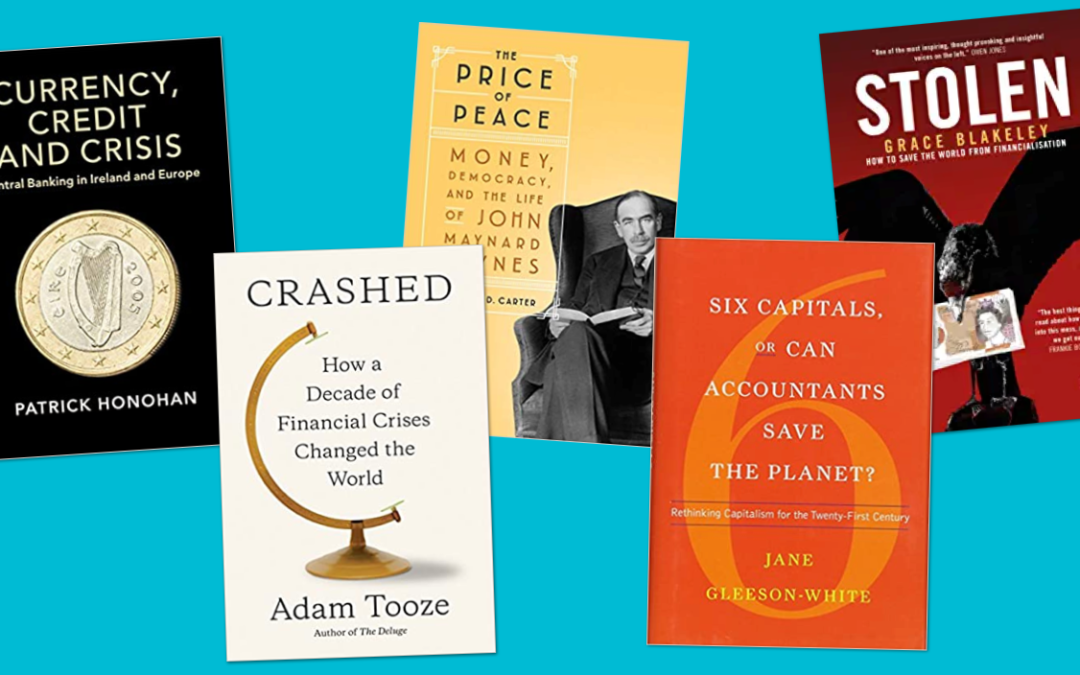Last year we recommended a few books to enjoy during the summer break. You seemed to eat up those recommendations, so we decided to add a few more should you need some reading inspiration for 2020!
Which one will you read first?
Currency, Credit and Crisis: Central Banking in Ireland and Europe by Patrick Honohan
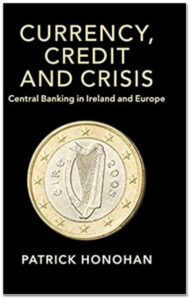 Patrick Honohan is an Irish economist who served as the Governor of the Central Bank of Ireland from 2009 to 2015. Previously, he spent 12 years on the staff of the World Bank as a senior advisor on financial sector issues. He taught in Dublin and in London.
Patrick Honohan is an Irish economist who served as the Governor of the Central Bank of Ireland from 2009 to 2015. Previously, he spent 12 years on the staff of the World Bank as a senior advisor on financial sector issues. He taught in Dublin and in London.
His book Currency, Credit and Crisis: Central Banking in Ireland and Europe provides a perspective on how a central bank works and faces challenges in a small country like Ireland. He shares his personal experience as Governor, giving insights into the political and economic turmoil that shook Ireland from 2010 to 2013.
Why we liked it: Honohan’s book is an excellent example of how personal insights and informative details can create an interesting page-turner. He looks back at the choices made during the worst financial crisis of the last few years, providing a first-rate account of the political atmosphere at the time. Honohan also includes facts and figures on the functioning of the Eurozone and central banks – very handy for anyone who is not an expert in the field.
The Price of Peace: Money, Democracy, and the Life of John Maynard Keynes by Zachary D. Carter
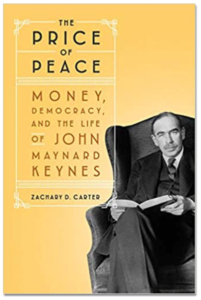 In this current New York Times bestseller, author Zachary D. Carter provides a fascinating biography of the economic colossus John Maynard Keynes. Carter gives a detailed account of Keynes’ life from his early days at Cambridge – shaped by exchanges with intellectuals and artists such as Bertrand Russel, Ludwig Wittgenstein and Virginia Woolf. Keynes’ marriage to the beautiful Russian ballerina Lydia Lopokova is also covered, as is his untimely death just after the creation of the Bretton Woods system that he helped shape.
In this current New York Times bestseller, author Zachary D. Carter provides a fascinating biography of the economic colossus John Maynard Keynes. Carter gives a detailed account of Keynes’ life from his early days at Cambridge – shaped by exchanges with intellectuals and artists such as Bertrand Russel, Ludwig Wittgenstein and Virginia Woolf. Keynes’ marriage to the beautiful Russian ballerina Lydia Lopokova is also covered, as is his untimely death just after the creation of the Bretton Woods system that he helped shape.
While the biography of this extraordinary man ends after two thirds of the book, the author then goes on to write how Keynesianism came to shape politics and discipline of economics on both sides of the Atlantic to this day. Carter tirelessly details how Keynes’ ideas were shaped by two World Wars, the great depression and the ineptitude and paralysis of world leaders behind closed doors. Yet ultimately, a picture emerges of an idealist who believed great change comes from ingeniou modifications to the cogs and gears of the existing system, rather than complete reinvention of the wheel.
Why we liked it: Carter’s book, despite being written before the current pandemic, is especially relevant as we face the current health and economic emergencies with a system still scarred from the financial and the sovereign debt crisis. He writes that Keynes stood against excessive austerity which risked “social unrest and nationalist insurgence” and the hyper-financialisation of the global elite. Keynes claimed such financialisation led to a disconnect between social classes and the perception of economics as a “bloodless scientific investigation into unshakable laws of nature”. Reading through this 600-page lucid and smooth-flowing book, one gets the feeling of déjà vu over and over again.
Stolen: How to save the world from financialisation by Grace Blakeley
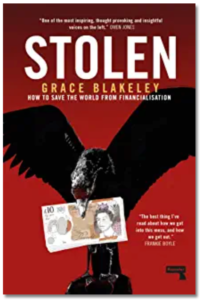 The 2008 financial crisis did not come out of nowhere. Economist and journalist Grace Blakeley shines a light on how thirty years of debt-fuelled growth and neoliberal ideology brought the global financial system to its knees – only to be bailed out using the money of the ordinary people it was exploiting.
The 2008 financial crisis did not come out of nowhere. Economist and journalist Grace Blakeley shines a light on how thirty years of debt-fuelled growth and neoliberal ideology brought the global financial system to its knees – only to be bailed out using the money of the ordinary people it was exploiting.
Stolen dives into the history of financialisation, from how the decline of trade unions allowed profits to be funneled to shareholders rather than workers, to how financialisation encouraged companies to buy out their competitors and build all powerful monopolies rather than improving productivity or increasing wages.
Why we liked it: Although Stolen focuses primarily on the British context, its analysis of how the post-2008 economy has become ever more slanted to benefit the already rich applies worldwide. If you’re looking for an accessible read on how financialisation has led to rising inequality, ecological collapse and stagnant wages, then look no further.
Crashed: How a Decade of Financial Crises Changed the World by Adam Tooze
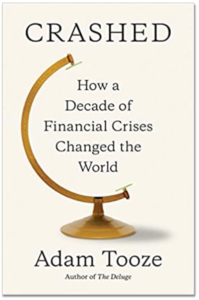 Published in 2018, this historical account of the post-2008 era is already a classic. Adam Tooze skillfully weaves together a wide range of events (the Trump election, the chaos in Ukraine, the emergence of European populists) into a majestic narrative of the financial meltdown in 2008 and its political consequences. Tooze makes clear that understanding these events requires us to take seriously what has long been pronounced but often ignored about globalisation – the intersection of the balance sheets of transnational corporations.
Published in 2018, this historical account of the post-2008 era is already a classic. Adam Tooze skillfully weaves together a wide range of events (the Trump election, the chaos in Ukraine, the emergence of European populists) into a majestic narrative of the financial meltdown in 2008 and its political consequences. Tooze makes clear that understanding these events requires us to take seriously what has long been pronounced but often ignored about globalisation – the intersection of the balance sheets of transnational corporations.
Why we liked it: The enjoyment of Crashed comes not from how the core argument is revealed, but from being fed striking insights on every page. It is a fascinating and easy-to-understand read which, in many ways, provides the historical backdrop for Positive Money Europe’s work. The ongoing pandemic has brought to life what the book fleshed out two years ago – the need for radical changes in the way we organise our financial system. What role should central banks’ play to fight the climate emergency, low inflation and increasing threats to financial stability? For anyone interested in the answer, Tooze’s book is a must-read.
Six Capitals, or Can Accountants Save the Planet? by Jane Gleeson-White
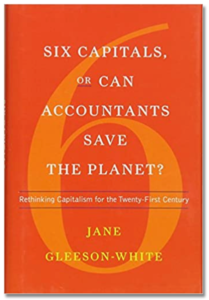 Accounting has played an important – yet rarely acknowledged – role in the development of the modern economy. Jane argues that accountants have the potential to hold nations and corporations accountable for their impact on nature.
Accounting has played an important – yet rarely acknowledged – role in the development of the modern economy. Jane argues that accountants have the potential to hold nations and corporations accountable for their impact on nature.
Once we find a way to properly account for the impacts of economic production on the bounty of nature and humanity, the choice between economic growth and promoting sustainability will no longer seem a contradiction. Six Capital’s presents a framework on how to integrate the six capitals – financial, manufactured, intellectual, human, social and natural – and save the planet before it’s too late.
Why we liked it: Six Capitals takes us through the history of accounting, from how the principles of double entry bookkeeping emerged in Venice in the 1400s, to more recent debates on accounting practices. Glesson-White makes a compelling case for integrating human, social and intellectual capital as well as natural capital.
Link to the updated 2020 edition: https://www.janegleesonwhite.com/six-capitals-2020

